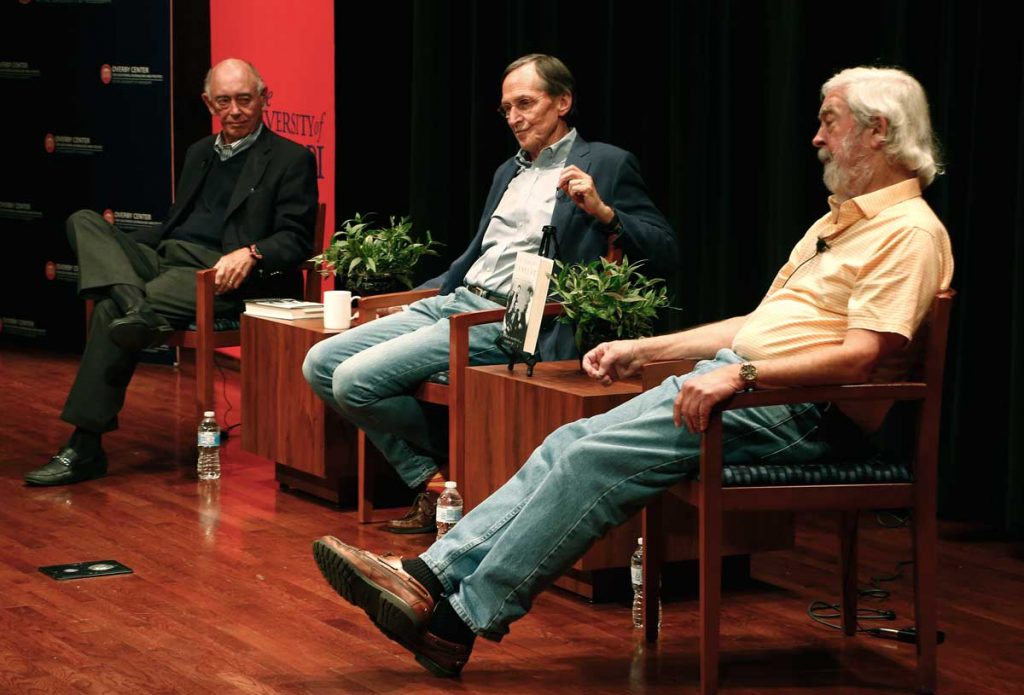
Curtis Wilkie discusses his book “The Road to Camelot” with Charles Overby and Tom Oliphant at the Overby Center on Wednesday, October 18. Photo By Xinyi Song
Journalists Curtis Wilkie and Thomas Oliphant presented their new book, “The Road to Camelot,” on Wednesday night in the Overby Center, detailing President John F. Kennedy’s relationship with the South during his presidential campaign.
Wilkie and Oliphant, former reporters at the Boston Globe, co-authored the book because Kennedy was someone who piqued their interest as young adults. Oliphant canvassed neighborhoods for Kennedy’s campaign in southern California, and Wilkie witnessed Kennedy campaigning in Texas.
Wilkie is a native of Greenville and a graduate of Ole Miss with a degree in journalism. He has been a reporter for the Clarksdale Press Register and the Boston Globe. He worked as a legislative aide to Sen. Walter Mondale and Rep. John Brademas and is a visiting professor at the university and a fellow of the Overby Center for Southern Journalism and Politics.
Oliphant is a native of Brooklyn, New York, and a graduate of Harvard University. He was a reporter for the Boston Globe, where he won a Pulitzer Prize. Oliphant has appeared on numerous news broadcasts such as “CBS This Morning” and “Today.”
“There’s nothing better than getting paid and going back to your childhood to try to figure something out,” Oliphant said. “What we witnessed in 1960 was the birth of modern politics.”
Wilkie previewed the book by saying it was different from most nonfiction pieces because of its novel-like writing style. He said that most nonfiction pieces can be hard reads, so they decided to take a different approach to historical writing.
“Even though it’s nonfiction, we wrote it in a narrative form,” Wilkie said. “We wrote it as if we were gods and heard the conversation.”
The major irony the writers discussed was Kennedy’s relationship with powerful Southern politicians called “Southern bulls.” The Southern politicians had been in office for a while and had “a lot of seniority” in Congress.
Kennedy knew that if he wanted to be successful, he had to build a positive relationship with these senators. Oliphant said this is why Kennedy was “a politician and an activist — not an ideologue.”
The duo also discussed the relationship between Kennedy and Vice President Lyndon B. Johnson. Johnson had a “friendly relationship with Kennedy” at first, but they ended up being enemies toward the end of the campaign.
“Johnson didn’t hold Kennedy in contempt as much as he despised Robert Kennedy,” Wilkie said. “He viewed Kennedy as a lightweight because Johnson was a master of the Senate.”
Charles Overby, chairman of the Overby Center, said he thought the presentation was successful.
“They did a great job of peeling back the onion on some of the lesser-known things about John Kennedy,” he said.
Overby said the two journalists drew the largest crowd for any event at the Overby Center so far.
David Crews, former communications director to Gov. William Winter, said he enjoyed the presentation.
“I thought this was a very insightful conversation, and these guys have obviously done their research,” he said. “I thought it was very revealing that the connection they made between Kennedy largely mounting the first modern presidential campaigns.”
Jade Richardson, a junior journalism major from Hurley, said she learned things she never would’ve learned without attending the talk.
“I learned about the interesting relationship between Kennedy and Johnson and how Kennedy rose to power in the Senate and as a presidential candidate,” she said. “I loved learning about his interesting relationship with Southern politicians.”






